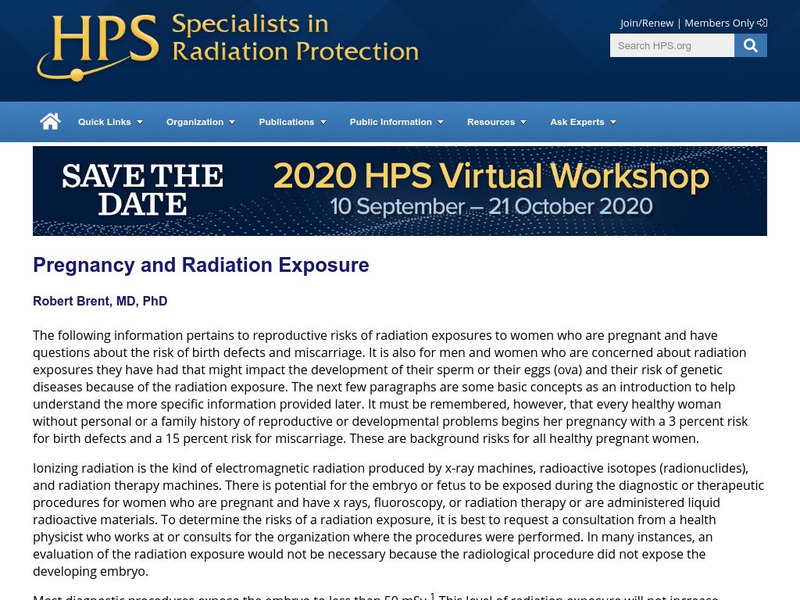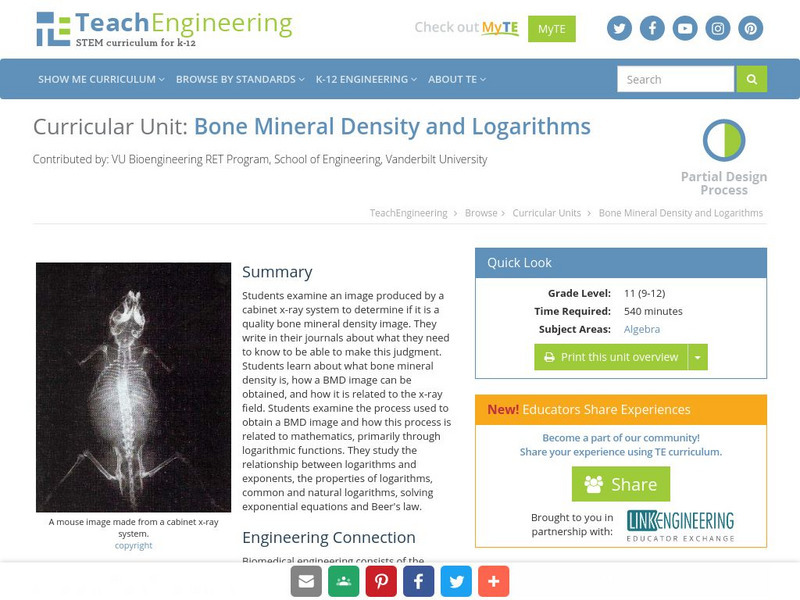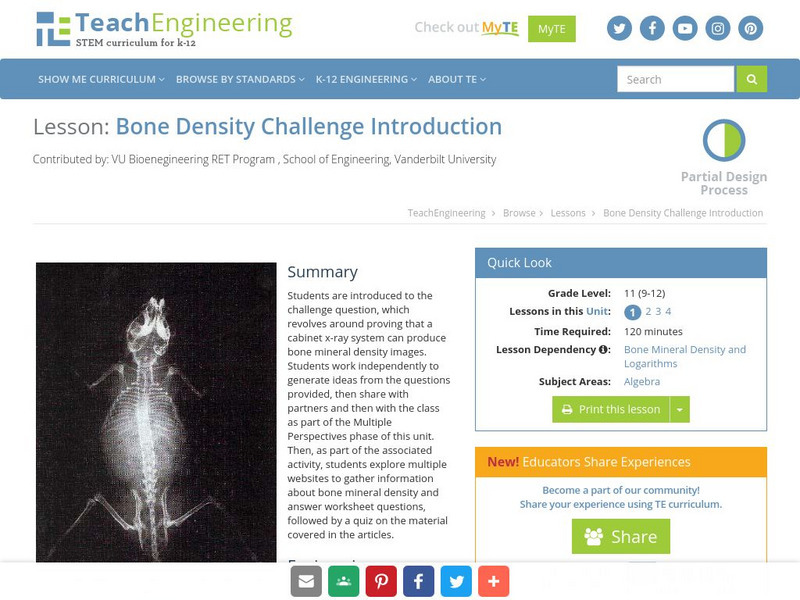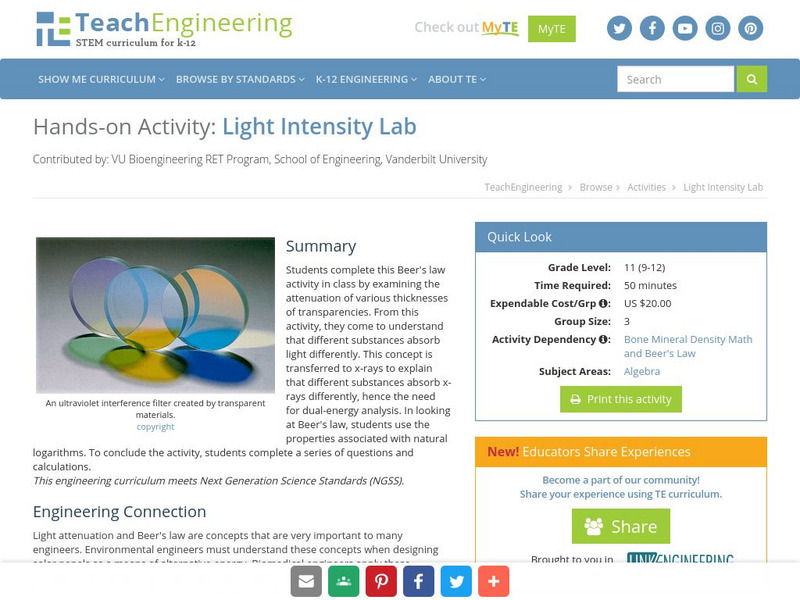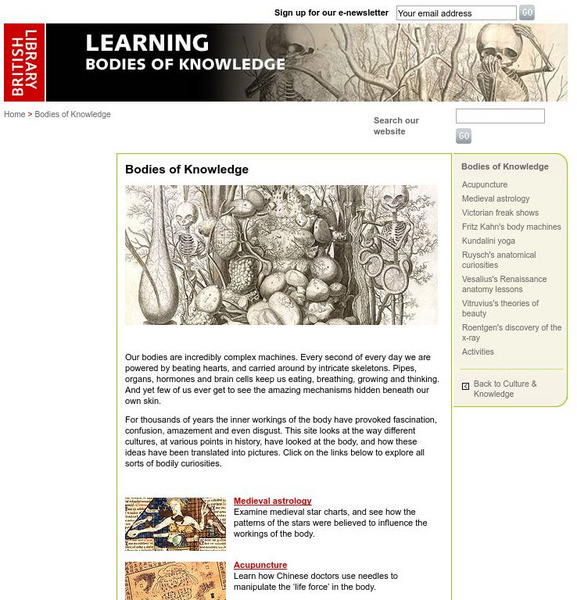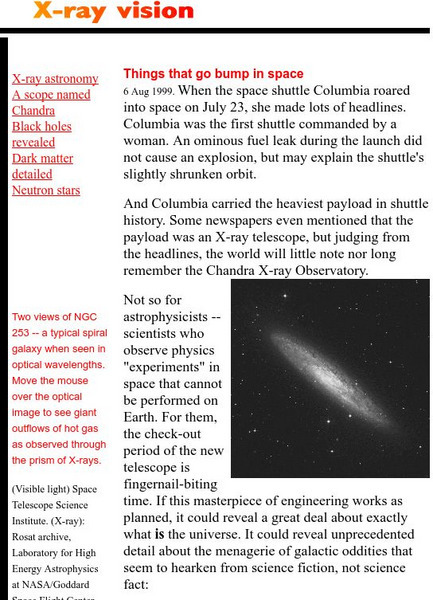Hi, what do you want to do?
Harvard University
Chandra X Ray Observatory Center: X Ray Pulsar
X-ray pulsars are explained. Features a Java applet that simulates a pulsar and allows the viewer to control the rotational speed.
Concord Consortium
Concord Consortium: Molecular Workbench:an Introduction to X Ray Crystallography
Investigate how we can learn about molecular structure using x-ray crystallography in this module.
University of Colorado
University of Colorado: Physics 2000: X Rays
Here's a really simple demonstration of a fluoroscope. There are links to more information about the uses of X-rays as well.
Science Museum of Minnesota
Science Museum of Minnesota: Lessons: X Rays
Lesson that teaches about X-rays and how they are used in diagnosing ailments of the heart and lungs.
Nobel Media AB
The Nobel Prize: Arthur Holly Compton Biographical
In addition to overviewing Compton's (1892-1962 CE) studies in x-rays, this article includes information on Compton's published works, his education, and personal life.
University of Colorado
University of Colorado: Physics 2000: Cat Scans: Projecting Shadows
This page and the three pages which follow discuss how X-ray technology can be used to produce an image of the human body. Discussion is understandable and highly intriguing. Several interactive animations allow the visitor to explore...
NASA
Nasa: Imagine the Universe: The History of Gamma Ray Astronomy
This NASA article discusses the history of gamma-ray astronomy. Related resources.
Harvard University
Chandra X Ray Observatory: Video Podcasts: The Incredible Two Inch Universe
A set of podcasts outlining a four-step process for understanding the vastness of our universe, from the vicinity of the Earth and Moon, out into distant galaxies. Downloadable instructions and a handout are included, as well as...
NASA
Nasa Star Child: Chandra X Ray Observatory (Level 2)
A description of the missions of Chandra. There is also an audio song. Glossary, graphics and printable version of page included.
National Inventors Hall of Fame
National Inventors Hall of Fame: William D. Coolidge: Vacuum Tube (X Ray)
This site provides a brief biography on William D. Coolidge, inventor of the X-ray tube, also known as the "Coolidge tube."
Lawrence Berkeley National Laboratory
Berkeley Lab: The E Xperiment Files
Discussion of the scientific method and the use of X-ray microscopy as an experimental technique. Explains the use of X-ray microscopy in the study of malaria.
Other
Translating Virtual Reality Into Physical Reality
A fascinating site which demonstrates the application of X-ray technology and other medical imaging techniques. Site explores how CT scans can be used to create models of the human body. Several pages with incredible graphics and...
NASA
Viewing the Violent Universe: What Are Gamma Rays?
The universe produces a broad range of light, only a fraction of which is visible to our eyes. Gamma rays are nonvisible light, which also includes x-rays, ultraviolet light, infrared radiation, and radio waves.
Nobel Media AB
The Nobel Prize: Arthur Compton Nobel Lecture: X Rays as a Branch of Optics
This site from the Nobel eMuseum provides great information on Arthur Holly Compton. The information is provided by links, ranging from a biography to the presentation speech, along with the nobel lecture and other resources.
Nobel Media AB
The Nobel Prize: The Nobel Prize in Chemistry 1964
This site from the Nobel eMuseum allows you to read about the recipient of the 1964 Nobel Prize in Chemistry, Dorothy Crowfoot Hodgkin (1910-1994 CE), who was honored "For her determinations by X-ray techniques of the structures of...
TeachEngineering
Teach Engineering: Bone Mineral Density and Logarithms
Students examine an image produced by a cabinet x-ray system to determine if it is a quality bone mineral density image. Students write in their journals about what they need to know to be able to make this judgment. Students learn about...
TeachEngineering
Teach Engineering: Exploring Bone Mineral Density
In this activity, students will explore two given websites to gather information on Bone Mineral Density and how it is measured. They will also learn about X-rays in general, how they work and their different uses, along with other...
TeachEngineering
Teach Engineering: Bone Density Challenge Introduction
Students are introduced to the challenge question, which revolves around proving that a cabinet X-ray system can produce bone mineral density images. Students work independently to generate ideas from the questions provided then share...
National Health Museum
Access Excellence: A Tour of the Human Skeleton
Click on the interactive skeleton and see actual X-rays of different bones. Compare normal bone x-rays with x-rays of damaged bones.
TeachEngineering
Teach Engineering: Light Intensity Lab
Students complete this Beer's Law activity in class. Students examine the attenuation of various thicknesses of transparencies. From this activity, students will understand that different substances absorb light differently. This can...
British Library
British Library: Bodies of Knowledge
Series of illustrated essays on the different ways that the human body has been represented in art and science across history considers medieval astrology, the ancient Chinese practice of acupuncture, Vitruvius's notion of body symmetry,...
University of Wisconsin
The Why Files: Things That Go Bump in Space
Contains an introduction to x-ray astronomy, describing how x-rays are being used by scientists to learn about the universe. Also contains links to sites describing black holes, dark matter, neutron stars, and how they are investigated...
Wikimedia
Wikipedia: Wilhelm Rontgen
This site from the Wikipedia encyclopedia provides a biography on Wilhelm Rontgen discusses his discovery of what became known as x-rays. The article also provides some information on his education and achivements throughout his life.
Other popular searches
- Animal X Rays Preschool
- Animal X Rays
- X Rays Mri Bones
- Preschool Lessons X Rays
- X Rays Art Preschool
- Understanding X Rays
- Bones and X Rays
- X Rays and Scans
- X Rays Preschool
- X Rays Tech
- X Rays Tech Schools
- Radiation and X Rays











